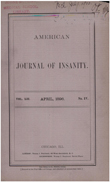Four-year outcome for cognitive behavioral treatment of residual symptoms in major depression
Abstract
OBJECTIVE: The authors' goal was to determine whether cognitive behavioral treatment of residual symptoms of depression might have a significant effect on relapse rate. METHOD: In an earlier study, 40 patients with primary major depressive disorder who had been successfully treated with antidepressant drugs were randomly assigned to either cognitive behavioral treatment of residual symptoms or standard clinical management. In both types of treatment, antidepressant drugs were gradually tapered and discontinued. In this study, a 4-year follow-up assessment was performed. RESULTS: Cognitive behavioral treatment resulted in a substantially lower relapse rate (35%) than did clinical management (70%). CONCLUSIONS: Cognitive behavioral treatment of residual symptoms reduces the risk of relapse in depressed patients, probably by affecting the progression of residual symptoms to prodromes of relapse.
Access content
To read the fulltext, please use one of the options below to sign in or purchase access.- Personal login
- Institutional Login
- Sign in via OpenAthens
- Register for access
-
Please login/register if you wish to pair your device and check access availability.
Not a subscriber?
PsychiatryOnline subscription options offer access to the DSM-5 library, books, journals, CME, and patient resources. This all-in-one virtual library provides psychiatrists and mental health professionals with key resources for diagnosis, treatment, research, and professional development.
Need more help? PsychiatryOnline Customer Service may be reached by emailing [email protected] or by calling 800-368-5777 (in the U.S.) or 703-907-7322 (outside the U.S.).



